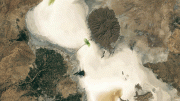
This image of Mars shows a slice of the maze-like Noctis Labyrinthus. The central cliff is part of a horst-graben system, featuring raised ridges (horst) and sunken valleys (graben) formed by tectonic forces pulling the planet’s surface apart. Credit: ESA/Roscosmos/CaSSIS, CC BY-SA 3.0 IGO
An image captured by the ExoMars Trace Gas Orbiter on August 3, 2020, details the intricate geological features of Mars’ Noctis Labyrinthus region, highlighting fallen rocks, a horst-graben system, and evidence of wind action and minor impacts. It shows part of a 1200 km network of plateaus and trenches and provides crucial data for future missions, including the anticipated arrival of the Rosalind Franklin rover.
There’s more to this image of Mars than first meets the eye: nestled in the detail of the cliff face that cuts through this scene are signs of geology in motion. Zooming in reveals many rocks that had fallen from the cliff edge and left little dimples in the soft material as they slid downslope.
Tectonic Features Unveiled
The image was taken by the CaSSIS camera onboard the ESA/Roscosmos ExoMars Trace Gas Orbiter on August 3, 2020, and captures a slice through the maze-like system of the aptly named Noctis Labyrinthus. The cliff-like feature running through the central portion of the image is part of a horst-graben system, which comprises raised ridges and plateaus (horst) either side of sunken valleys (graben) created as a result of tectonic processes that pulled the planet’s surface apart. The entire network of plateaus and trenches making up Noctis Labyrinthus spans some 1200 km (750 mi), with individual cliffs reaching 5 km (3 mi) above the surface below.
Wind and Impact Craters
Patches of linear ripples produced by the wind may be found elsewhere in this photograph, particularly on the right-hand side. A few minor impact craters dot the landscape as well.
The image was taken over the easternmost part of Noctis Labyrinthus at 265.8°E/8.70°S in the Phoenicis Lacus Quadrangle, near the intersection with Lus Chasma of Valles Marineris – the ‘grand canyon’ of Mars.
TGO landed on Mars in 2016, and its full science mission began in 2018. Not only is the spacecraft delivering magnificent photographs, but it is also giving the best ever inventory of the planet’s atmospheric gases and mapping the planet’s surface for water-rich locations. It will also provide data relay services for the second ExoMars mission, which will arrive on Mars in 2023 and include the Rosalind Franklin rover and the Kazachok platform.









TO THE LOWER LEFT THE PICTURE. AT BOTTOM OF CLIFF. LOOKS LIKE A BIG FOSSIL OF SOME TYPE OF LIFEFORM. LOOK INTO IT.
At the bottom of the ridge of mountains in this picture, between two peaks is a rectangle object. Zoomed in on it has definite right angles. What is that?
A rock.
Meaning no offense, but could you imagine the size of something if it left a fossil visible from orbit? The sheer size of it? We would be seeing many other indicators if something that big had been there. Just my two cents.
Oh wow !!!!!! no wander we haven’t heard their music anymore
Great minds think alike
What is a band doing on Mars?
A rock.
So much desperate seeking of mystery and meaning in the comments. It is easy to see how religions started.